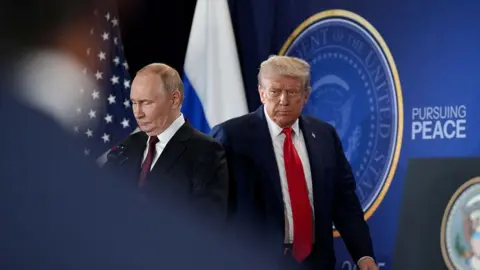Bernd Debusmann Jr.at the White House And
Max Matza
The United States has announced new sanctions against Russia's two largest oil companies, Rosneft and Lukoil, in an attempt to pressure Moscow to negotiate a peace deal in Ukraine.
“Every time I talk to Vladimir, I have good conversations, and then they don’t go away. They're just not going away,” President Donald Trump said after meeting with NATO Secretary General Mark Rutte to discuss peace talks.
The sanctions announcement came a day after Trump said a planned meeting with Russian President Vladimir Putin in Budapest would be postponed indefinitely.
Earlier on Wednesday, Russia launched an intense bombing campaign against Ukraine that killed at least seven people, including children.
US Treasury Secretary Scott Bessent said new sanctions were needed because of “Putin's refusal to end this senseless war.” According to him, these oil companies finance the Kremlin's “war machine”.
“Now is the time to stop the killing and cease fire immediately,” Bessent said in a statement.
Speaking with Rutte in the Oval Office on Wednesday, Trump criticized Putin for not taking peace seriously and expressed hope that sanctions would help achieve a breakthrough.
“I just felt it was time. We've waited a long time,” Trump said.
He called the package of sanctions “huge” and added that he hoped they could be lifted quickly if Russia agreed to stop the war.
Rutte also praised the move, saying it “puts more pressure” on Putin.
“You have to apply pressure and that's what he did today,” Rutte said.
 Getty Images
Getty ImagesThe move comes as key differences between US and Russian peace proposals have become increasingly apparent this week. Trump pointed out that the key stumbling block is Moscow's refusal to stop fighting along the current front line.
Last week The UK introduced a similar package of sanctions against Rosneft and Lukoil..
“Russian oil has no place on world markets,” British Chancellor Rachel Reeves said as she announced the move.
Responding to Britain's request, the Russian embassy in London said an attack on its country's largest energy companies would disrupt global fuel supplies and lead to increased costs around the world.
He also said sanctions would have a “detrimental impact on the energy security” of developing and underdeveloped countries, adding that “pressure only complicates peaceful dialogue and leads to further escalation.”
Two Russian oil companies export 3.1 million barrels of oil per day. According to UK government estimates, Rosneft accounts for almost half of all oil production in Russia, which is 6% of global production.
Oil and gas are Russia's largest exports, and Moscow's biggest clients are China, India and Türkiye. Trump also called on these countries to stop buying Russian oil in an attempt to put economic pressure on the Kremlin.
Trump's move was praised by British Foreign Secretary Yvette Cooper, who said the US sanctions were “warmly welcomed”.
EU Commission President Ursula von der Leyen wrote on X that she spoke by phone with Bessent on Wednesday about Russia's “lack of commitment to the peace process.”
She also praised a new package of sanctions approved by the European Union on Wednesday, which includes a ban on imports of Russian liquefied natural gas.
“With the imminent adoption of the EU's 19th package, this is a clear signal from both sides of the Atlantic that we will continue to put collective pressure on the aggressor,” she wrote.
Earlier this year The UK and US have also imposed sanctions against large Russian energy companies. Gazprom Neft and Surgutneftegas.
At the White House, Rutte was expected to discuss a 12-point plan formulated by European NATO allies and Kiev that would include a freeze on current front lines, the return of deported children, and a prisoner exchange between the two warring countries.
The plan also includes a post-war reconstruction fund for Ukraine, as well as security and a clear path for Ukraine's entry into the EU, as well as increased military aid to Kyiv and economic pressure on Moscow.
Earlier this week, Trump said he didn't want a “waste meeting” with Putin in Budapest and suggested the main point of contention was Moscow's refusal to stop fighting on the current front lines of the war.
He last met Putin in Alaska for a summit that the White House hoped would end the conflict. Instead, the fighting continued.
A preparatory meeting between US Secretary of State Marco Rubio and Russian Foreign Minister Sergei Lavrov was also postponed. This week's meeting was no longer “necessary” after a “productive” conversation, the White House said.
Trump has repeatedly approved proposals to freeze hostilities on current front lines.
“Let everything be reduced as it is,” he said on Monday. “I said: cut and stop on the battle line. Go home. Stop fighting, stop killing people.”
Russia opposed this idea. Kremlin spokesman Dmitry Peskov said “the consistency of Russia’s position does not change,” referring to its desire for Ukrainian troops to leave the Donbass region in eastern Ukraine.
On Wednesday, Trump also pushed back against a Wall Street Journal report that the U.S. approved Ukrainian long-range missile strikes on Russia, calling it “fake news.”
Ukrainian President Volodymyr Zelensky has expressed a desire for the United States to supply his troops with long-range Tomahawk missiles and suggested that the threat of their use in theater could bring Russia to the negotiating table.
Pritti Mistry and Danielle Kay contributed to this report.








